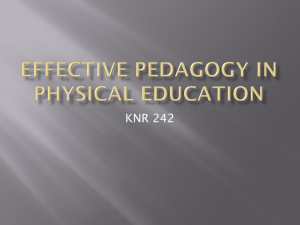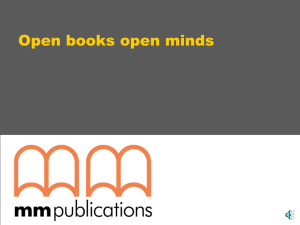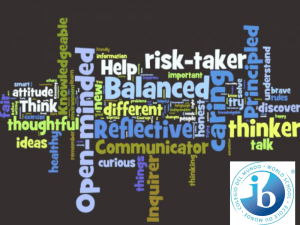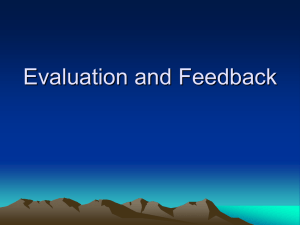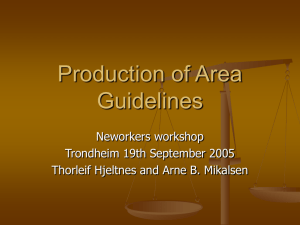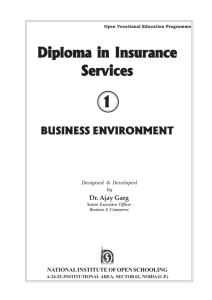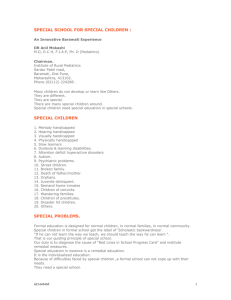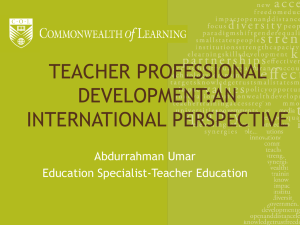Making Distance Education Work
advertisement
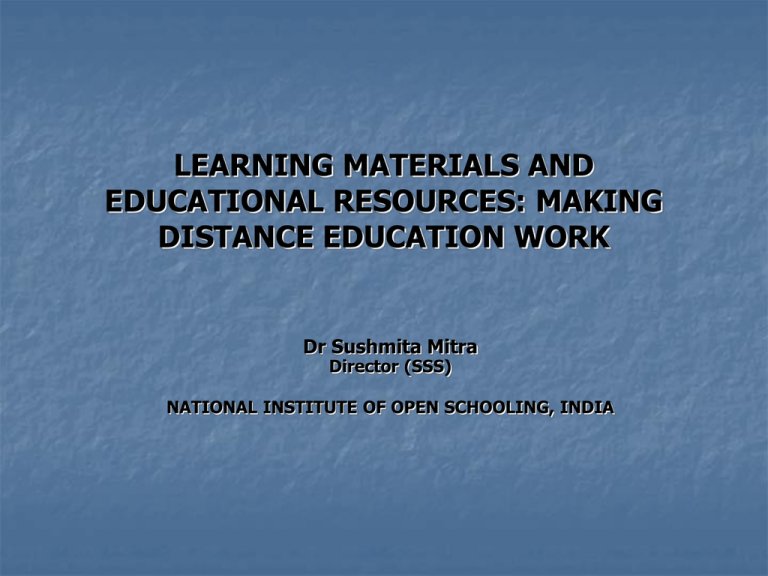
LEARNING MATERIALS AND EDUCATIONAL RESOURCES: MAKING DISTANCE EDUCATION WORK Dr Sushmita Mitra Director (SSS) NATIONAL INSTITUTE OF OPEN SCHOOLING, INDIA AGENTS OF CHANGE IN EDUCATION Rapid development in learning theories. Rapid advancement in Information and Communication Technology (ICT) PARADIGM SHIFT PARADIGM SHIFT IN EDUCATION From Institution-led learning to own-time selflearning at a distance. From teaching to self-paced-learning slowly moving towards flexibilities and openness. Gave rise to an alternative system of education often known as Open and Distance Learning (ODL) System. LEARNING PARADIGM SHIFT TEACHER TAUGHT TRADITIONAL SYSTEM SPATIO-TEMPORAL FIXEDNESS CURRICULUM FIXEDNESS PARIDGM SHIFT SELF LEARNING CORRESPONDENCE EDUCATION FREEDOM OF LOCATION CURRICULUM FIXEDNESS PARIDGM SHIFT SELF LEARNING ODL EDUCATIONAL SYSTEM FREEDOM OF LOCATION FREEDOM TO LEARN The barriers of space, pace, time and many of the rigidities of the formal education are withdrawn in ODL and this gave rise to Open Schooling system in the country. NATIONAL INSTITUTE OF OPEN SCHOOLING(NIOS) 14 STATE OPEN SCHOOLS (SOSs) IN DIFFERENT STATES PERSPECTIVES AND ORIENTATIONS TOWARDS LEARNING IN ODL SYSTEM Everyone can learn (Burns 1967). Learning is private and occurs at a distance when the learner and the instructor/ institution are separated in time and place Learning is mediated by a provider arranging for guided didactic conversation, or non contiguous communication, or two way interpersonal communication to recreate learning link, or educational transaction using technology and communication theory, or virtual contiguity by integrating systems that bring teacher and learner together, optimum dialogue between them and eliminate consequences of being separate in space. PERSPECTIVES AND ORIENTATIONS TOWARDS LEARNING IN ODL SYSTEM Learning involves collaborated experience between a teacher and a learner, which is totally dependent on a two way communication facilitated by technology. Learning considers requirements of both the learning task and learner i.e. principles of pedagogy/andragogy and structure of knowledge has an apparent influence on learning. Learner control is based on the inter-relationship between independence (as in self directed learner), proficiency (as in the ability to learn independently) and support (characterized by the resources available to guide and facilitate the educational transaction. Learner Centred Instructional System in Open Schooling 1. COUNSELLING 7. RESOURCE CENTRE HELP 2. COURSE MATERIALS 3. ASSIGNMENTS LEARNER 6. FACE TO FACE PROGRAMME 5. RADIO AND TV, 4. TUTOR GUIDANCE Instructional Delivery System Based on following premises: Availability, Accessibility and Appropriateness For transaction of the curriculum at a distance, the print medium is most suitable. Print considered as the prime instructional medium supported by other media materials like audio and video materials in Open schooling. Efficacy of Print Materials Depends on the Instructional Design (ID) chosen. ID is dependent on the nature of subject matter, learner characteristics and previous experiences and the type of learning expected. Printed Learning Materials In Open Schooling Self-instructional Material (SIM) which is a written elaboration of a set of learning opportunities, organised around a well-defined theme/topic in such a way that, it is • a self contained instruction unit to be used in a self learning situation. • guarantees self-sufficiency. • structured in such a way that it helps the learner to find their way into the text and to find their way through the text. Structure of A Lesson Title Introduction Objectives Section Intext Questions NO Is it the last section yes What you have learnt Glossary /Key Words Terminal Exercise Answers to Intext Question Educational Resources Support materials: Audio CD’s Video CD’s CAL Radio programmes through Gyan Vani TV programme through Gyan Darshan/and DD1 channel The NIOS WEBSITE www.nios.ac.in Information dissemination 24x7 online admission Course material Evaluation/assessment papers for practice Tutor marked assignments Student information regarding admission and examination dates List of Study centers Other related matter Enrolment of Differently Able Learners in NIOS 9000 8000 7695 7000 No of Learners 6000 5000 2009-10 2008-09 4000 2826 3000 2000 1576 1337 1260 842 1000 601 196 283 566 1199 992 710 181 133 338 0 Loco Motor Visually Impaired Hearing Impaired Leprosy Cured Mentally Retarded Multiple Cerebral Palsy Learning disability Course-wise Enrolment of Differently Able Learners 2000 1829 1800 1600 No of Learners 1400 1200 SEC 997 1000 SRSEC 808 800 660 677 602 600 391 382 400 291 240 200 117 166 172 99 82 79 0 Loco Motor Visually Impaired Hearing Impaired Leprosy Cured Mentally Retarded Multiple Cerebral Palsy Learning disability There is nothing like a dream to create the future. ....Victor Hugo Thank You



